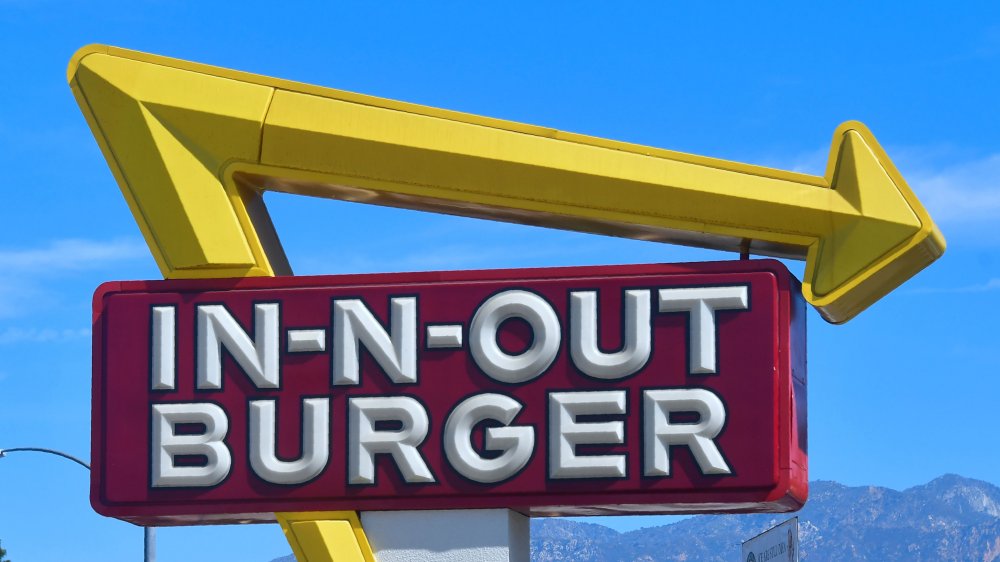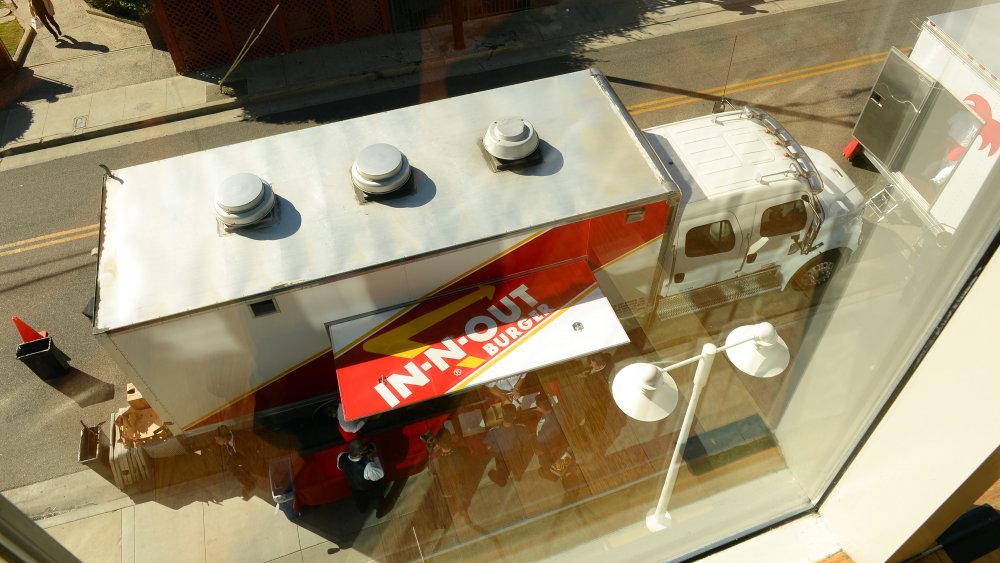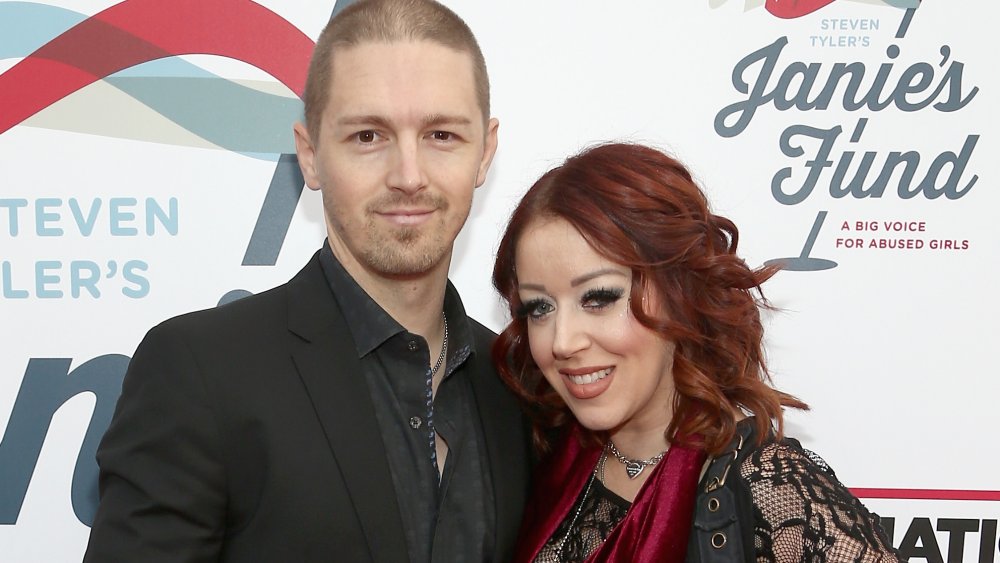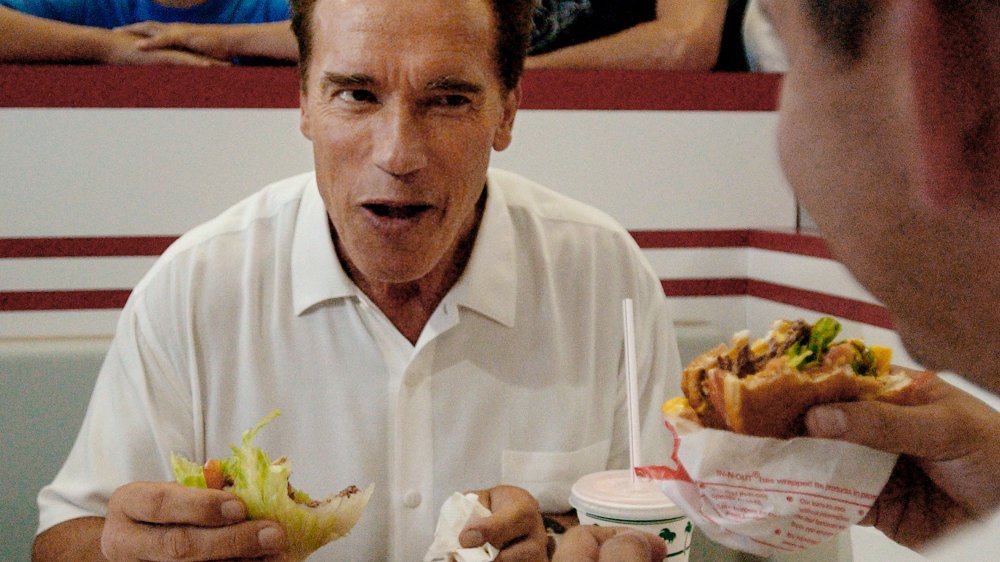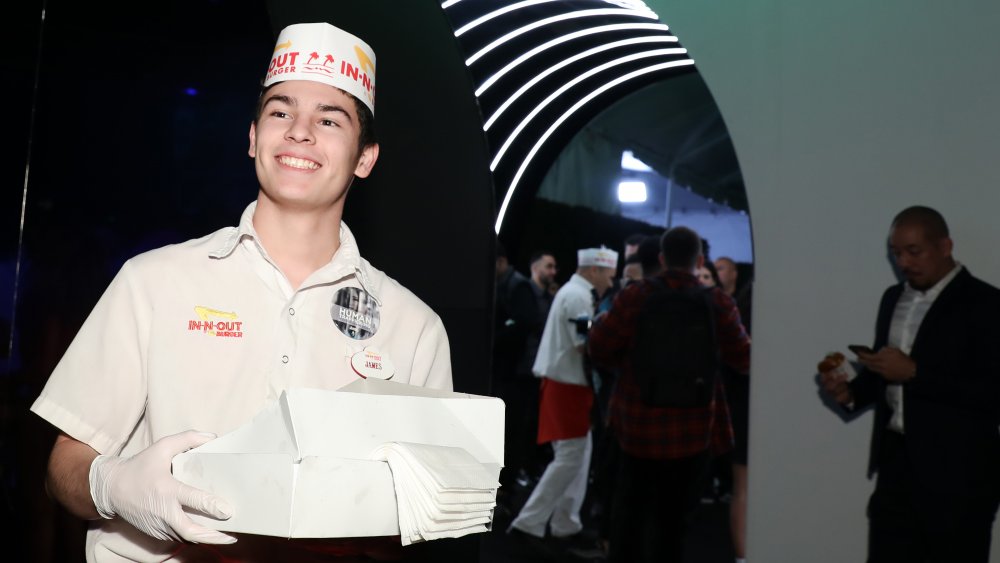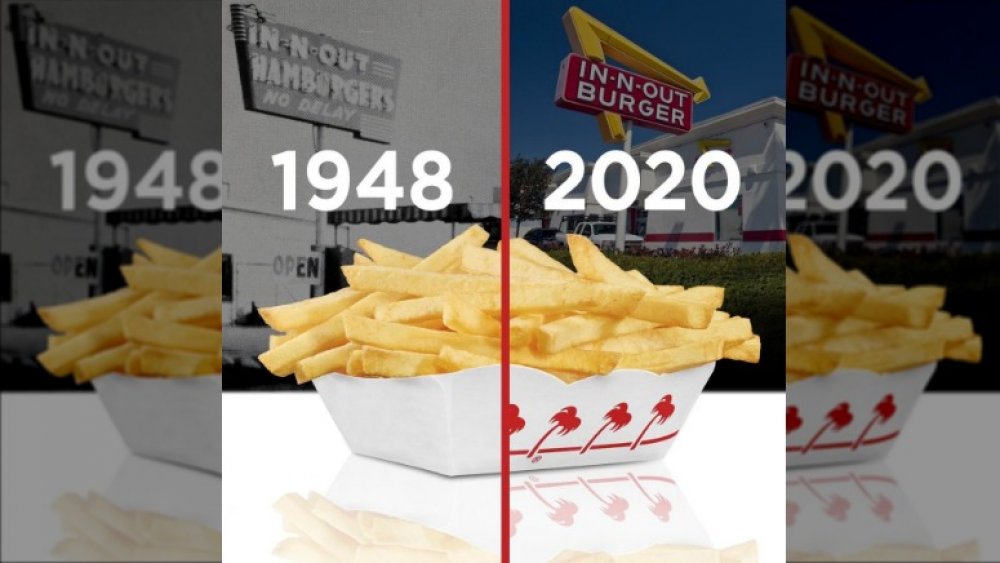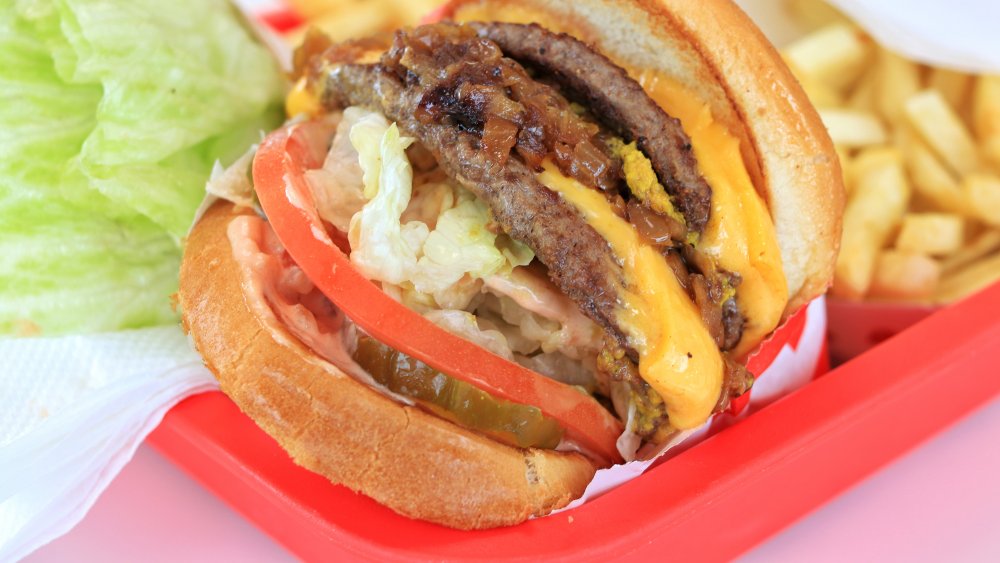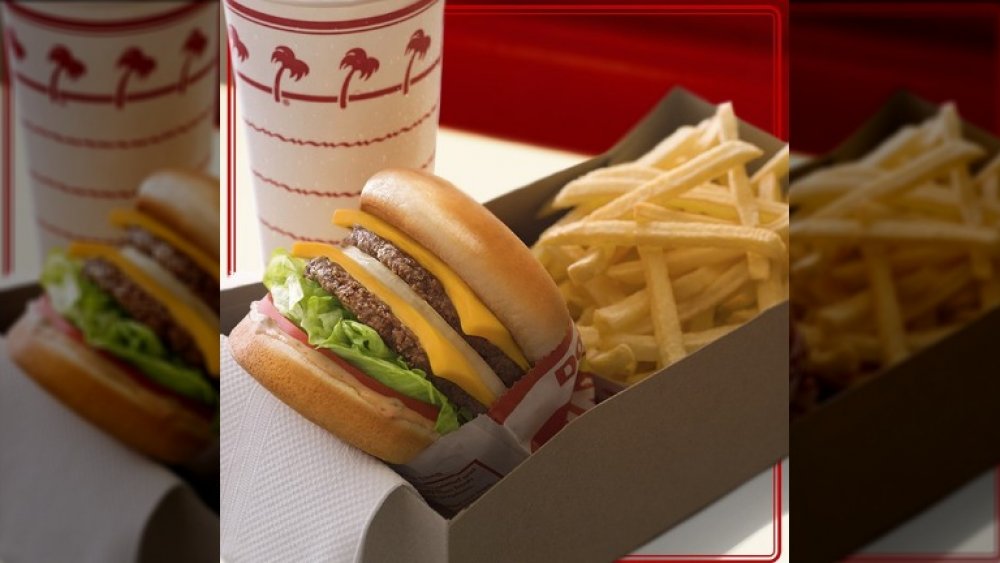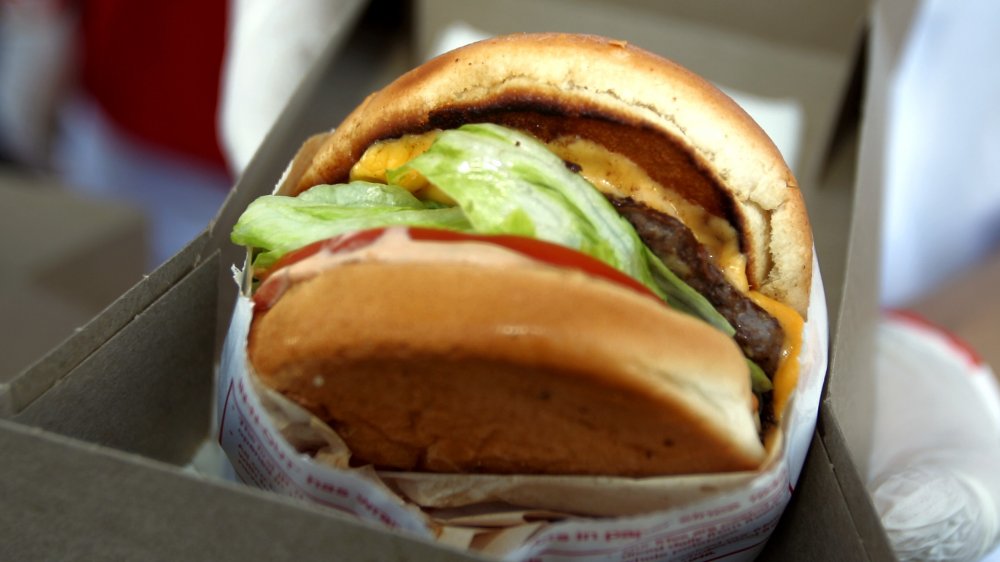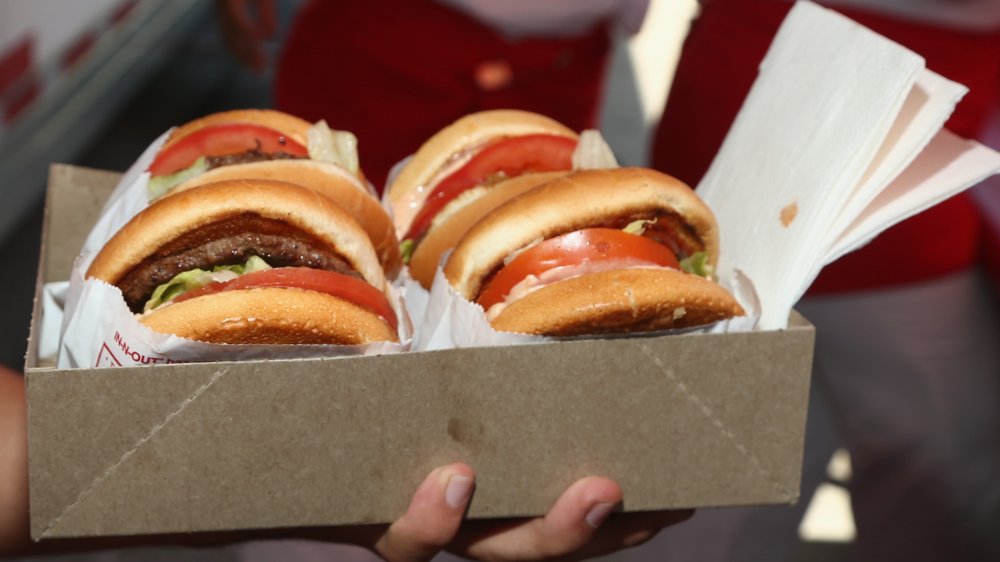Secrets In-N-Out Burger Doesn't Want You To Know
In-N-Out Burger has the kind of cult following that most companies dream of. When they open a new restaurant, excited burger-lovers often wait in line for two to three hours for their chance to scarf down a Double-Double or another concoction from the chain's "secret menu" (not so secret, actually, considering most items are listed on the company's website).
For instance, when a new store opened up in Keizer, Oregon, the local Statesman Journal noted wait times of up to three hours on opening day, and even a month after opening waits of up to 30 minutes.
And while the company earns perennially good reviews — according to Business Insider it topped the list of America's favorite burger chains in 2019 – it's not a company without faults or a less-than-perfect history. Company executives may not be trying to keep their menu secret from fans, but there are a few things they'd prefer to keep quiet from the general public. These are the secrets In-N-Out Burger doesn't want you to know.
In-N-Out won't expand to the East Coast
In-N-Out Burger's rabid followers are forever hopeful that the company will expand to the East Coast. And given In-N-Out's popularity, it would seem logical that the company would want to put a restaurant in the center of high-population areas like New York City, but expansion to the East Coast isn't going to happen.
In an interview with Forbes, Lynsi Snyder, the CEO of In-N-Out and granddaughter of the company's founders, shares that while she's embraced slow and steady expansion since she took over the company in 2010, it's critical to her that the company retains the high standards her grandparents developed when they opened the first restaurant in 1948. This means the company, for now, won't expand farther east than Texas. This is because all food products are delivered daily to restaurants from company-owned distribution centers where meat is ground and bread is baked daily. There are only a handful of these centers in the United States, with the one farthest east being in Texas, and according to Business Insider, all restaurants must be located within 300 miles of one of these centers.
These regulations allow the company to maintain strict control over food quality standards, including the fact that the company never uses microwaves, freezers, or heat lamps on its food. Considering that the company doesn't have a distribution center farther east than Texas, and has no plans to build one, that pretty much guarantees there won't be East Coast expansion anytime soon.
In-N-Out's founding family has a tragic history, including drug abuse
CEO Lynsi Snyder, while deeply private, doesn't mince words when it comes to talking about the challenges she and her family have faced. In her interview with Forbes, she recounted how her father, Guy, was passed over for the role of CEO in 1976 when her grandfather died, due to his ongoing struggle with drugs and alcohol. Then, in 1993, Snyder's uncle (and In-N-Out CEO) Rich, died in a plane crash following a visit to the opening of a store in Fresno, California. Snyder's grandmother, Esther, took over the role of CEO following Rich's death, and Snyder's father was appointed chairman and executive vice president. Unfortunately, Guy's struggle with drugs and alcohol continued, and following three overdoses, he died in 1999 of a drug-related heart attack.
According to a People article on Snyder, her father's death sent her spiraling, and she turned to men, alcohol, and marijuana as a way to cope with her grief. In her early 20s, after her first divorce, she realized she was following too close in the footsteps of her father, and feared she might also die young. It was during this period that she found renewed Christian faith and stopped abusing alcohol and drugs.
Lynsi Snyder became president in 2010, at the age of 27.
In-N-Out has contributed to the Republican Party
It seems especially surprising that In-N-Out, a company based in the highly-liberal state of California, would have donated money to the conservative Republican party. But in 2018, the Los Angeles Times chronicled how the California Democratic Party called for a boycott of the restaurant after discovering In-N-Out had donated $25,000 to the Republican Party. This revelation sent Republican lawmakers and supporters flocking to the restaurants for burgers and selfies promoting the business' values.
And come to find out, it wasn't the first donation, either. The LA Times notes that In-N-Out donated to the Republican Party in 2016 and 2017, too. That said, In-N-Out appears to be an equal-opportunity organization when it comes to political affiliation. The boycott of In-N-Out failed largely because the company also made contributions to Democratic-affiliated committees in the same years, and has developed a strong reputation as a good employer committed to supporting fair wages and benefits to its associates.
In-N-Out doesn't appreciate pranksters
In the brave new world of YouTube stars and social media influencers, companies often have to walk a fine line between appreciating the potential exposure and advertising such individuals offer, and fighting back against pranks that could damage a brand's reputation.
In 2018, In-N-Out made it clear that the company does not stand for the types of pranks that interfere with day-to-day operations or the enjoyment of customers while dining at their restaurants. CBS News reported that YouTube star Cody Roeder (aka Trollmunchies) entered In-N-Out Burger locations on two separate days, claiming to be the newly-appointed CEO. He proceeded to talk loudly about "food contamination," and in one case, pulled apart the burger of a customer, throwing the separated lettuce and meat to the ground.
In-N-Out attorneys and Executive Vice President, Arnie Wensinger, responded quickly and severely, seeking a restraining order and damages of more than $25,000, stating that such antics cause "significant and irreparable harm" to the business. Clearly, this type of social media influence isn't taken lightly by In-N-Out.
The french fries at In-N-Out are bad
It doesn't matter how good the burgers are, In-N-Out french fries are bad. Like, according to the LA Times, they're the worst in the business. Which kind of blows the mind given how much the company focuses on food quality.
The general consensus on the matter is that In-N-Out's fries are tasteless and limp, lacking the crispy exterior and soft interior of competitors' fries. This is largely due to the fact that the company doesn't soak their fries in water before frying them, and according to LAist, they also don't double-fry their fries. The double-fry technique allows the fries to cook through on the first fry, and to achieve a crispy, golden exterior on the second fry.
At In-N-Out, associates fresh-cut potatoes on the spot, almost immediately tossing them into the fryer before serving them to guests. This allows for a fresher fry, but it lacks the consistency and taste most people expect when eating fast food fries. There is a workaround, though, if you want a better french fry experience — just ask for them "well done" — associates cook them longer and the result is, at the very least, a crispier version of a sub-par fry.
In-N-Out's "Secret Sauce" is basically just Thousand Island dressing
According to a Reddit thread of Q & A's answered by an alleged In-N-Out associate, if you don't have an In-N-Out near you, it's really not that hard to recreate the burger at home. We've even done it ourselves.
Ingredients are simple — high-quality beef, sponge dough buns, American cheese, tomatoes, and iceburg lettuce. The only "secret" part of the burger is the secret sauce, but even that isn't hard to emulate at home. According to the associate, the secret sauce is basically just Thousand Island dressing. Grab a bottle of it at your local grocery store, and you can assemble your own burgers at home.
The associate notes that they use a specific order for layering items — first place the spread on the bottom, then follow the spread with tomatoes, lettuce, meat, and cheese, in that order. This is presumably to help keep the veggies in place. Finish assembling your meal by frying up some french fries at home. You could even just bake up some frozen french fries — they'll probably taste better than what you would get at In-N-Out.
In-N-Out's beef contains antibiotics
While In-N-Out has received high praise for food quality and freshness, including sourcing beef from local farms and grinding it in facilities within 300 miles of restaurants so patties never have to be frozen, the company doesn't receive the best marks for having a policy regarding antibiotic use in its meat supply chain.
According to an October 2018 report from the California Public Interest Research Group, In-N-Out, along with 21 other burger chains, received an "F" for its stated policy on antibiotic use in beef. Only three restaurants escaped the "F" rating, including Wendy's, which received a D-, and Shake Shack and BurgerFi, which both received As.
The concern with serving beef from cows that have been treated with antibiotics is that this is another way that humans are being exposed to antibiotics, raising the risk of antibiotic-resistance and diseases or infections that can't be readily treated with common antibiotics. When restaurants develop policies to reduce the influx of antibiotics into the food supply, they're helping promote and preserve the health of the overall community.
That said, according to the same report, in 2016 In-N-Out announced plans to source beef raised without medically important antibiotics, which is at least a step in the right direction. Unfortunately, as of the writing of this article, no further announcements or timelines have been set by the company to actually institute this action.
In-N-Out's burgers taste great, in part, due to their huge fat content
Think about foods that make your mouth water — things like chocolate, ice cream, fried chicken, and of course, an In-N-Out hamburger. As a general rule, all of these foods have a high level of fat. Fat gives food flavor and delivers a juicier consistency to your favorite fare — that's the reason fat-filled foods tend to be tastier than lower-fat substitutions. And oh boy, the burgers at In-N-Out come flooded in fat. According to In-N-Out's nutrition information, a basic hamburger with onion (not even a cheeseburger!) contains 19 grams of fat, five of which are saturated. Order a cheeseburger, and you bump the fat content up from 19 to 27 grams, doubling the saturated fat.
To be clear, consuming fat is a normal part of eating a well-balanced diet. Eating fat doesn't make you fat. But fats, compared to proteins and carbohydrates, are a more energy-dense macronutrient — one gram of fat contains more calories than one gram of protein or carbs. The more fat you consume in your diet, the more calories you'll consume as well.
That basic In-N-Out cheeseburger has just shy of 500 calories and that doesn't include any calories you might indulge in with fries or a drink. For a meal or two here or there, there's no real risk, but if you're stopping at In-N-Out for a double-double, milkshake, and fries every day, it's probably time to reevaluate your food choices.
In-N-Out's food containers include Bible verses
While it's not an outright secret that In-N-Out Burger food containers have sported Bible verses since roughly 1987 (Snopes confirms the fact, but notes it's not clear when the verses first appeared), the verses are stamped in inconspicuous locations on specific containers, including cups for sodas, milkshakes, and water, as well as on wrappers for basic burgers and the popular double-double. The family as a whole is religious, and in a Forbes interview, CEO Lynsi Snyder points to God and her Christian faith as her saviors during trying times in her life. Clearly, placing verses on food containers is one way to proselytize, and as a privately-held company, the decision to share faith in this way is solely within the hands of Snyder herself.
To be fair, it's a pretty low-key way of sharing religious views, considering a person has to be self-motivated enough to look up the meanings of each verse on his or her own, but for people who find such proselytizing offensive, In-N-Out may not be the place to buy a drive-thru burger.
